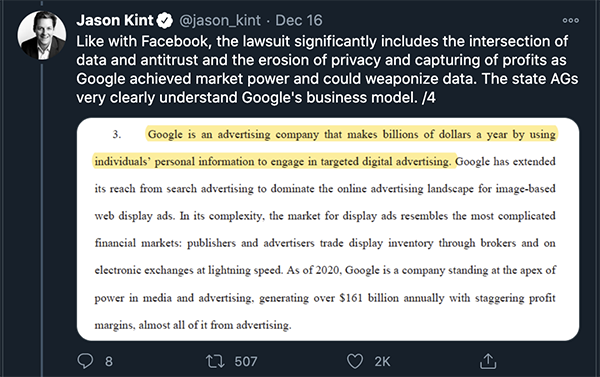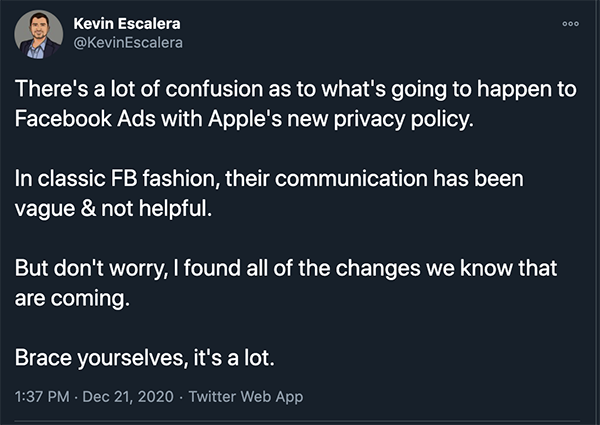 |
||||||||||||
|
||||||||||||
| Were Facebook and Google Colluding Against Everybody? |

Image sourced from Twitter
|
| If you haven’t heard the one about how Google and Facebook agreed to work together to shut out competitor ad exchanges and divvy up advertising profits by now, you must be living under a rock. Just when we thought the antitrust case against Google focusing on its search business wasn’t really looking at the heart of what could be deemed Google’s utmost anticompetitive practices, here comes news that 10 states are now suing Google for running an illegal advertising monopoly and bringing Facebook onboard as a partner to rig ad auctions. Four publishers—The Nation, The Progressive, Genius Media Group, and Sweepstakes Today—have also filed private suits against the Big G for violating the Sherman Act. Basically, on all accounts, Google is being accused of practices that make it hard for buyers and sellers to to business. The fact that Google sells technology to both buyers and sellers, while also running an ad exchange, is viewed as a major conflict throughout the industry. Google, for their part, maintains the position that the market is highly competitive and they have not engaged in anticompetitive practices. The tech giant also contends that the accusations about Facebook are entirely false. Google also stated: “Digital ad prices have fallen over the last decade. Ad tech fees are falling too. Google’s ad tech fees are lower than the industry average.” |
|
While the Google cases aren't currently calling for Google to be broken up, as the Facebook antitrust lawsuit does we can promise this will be one long drawn out fight—boxing gloves off. The suits are calling for structural remedies, and we’re sure there will be some hefty fines and penalties go along with those. We'd hate to see anyone go down, but pubs have been calling foul play on duopoly for many years now. Critics are saying this is finally an antitrust case with some teeth, that truly focuses on what they feel is Google abusing its monopoly. |
| Taboola to Repay Pubs $16 Million |
| As you can imagine, the breakup of Taboola and Outbrain, before they could even consummate their marriage hasn’t been good for either one of them—especially not in these days and times of COVID-19. According to Business Insider, Taboola took a big ole’ Coronavirs hit and as a result, switched up its deals with pubs from guaranteed to 100% rev share deals. One of the main reasons pubs do business with the content recommendation company is because they offer a guaranteed amount of revenue every month in exchange for content-recommendation exclusivity. But Taboola promised this would only be a temporary move, and now they’re making good on their word with plans to repay pubs $16 million of those revenue guarantees. |
| Of course, this is good news for publishers. Considering those guaranteed payments were part of budgeting plans for Q1 and Q2, pubs were left a$$ out. Remember how hard it was out here for publishers in those early Coronavirus days, when they had to resort to layoffs and furloughs? Also of note is that Taboola’s decision to withhold payments has been cited as one of the main reasons that Outbrain decided to part ways with its betrothed. Yet some sources suggest that since Taboola weathered the Coronavirus economic downturn far better than Outbrain, they were looking to revise the terms of the deal. From a business perspective though, doesn’t it seem timely that Taboola's move to repay publishers is coming at the same time the company is considering an IPO? Going public with major debts hanging over your head isn’t really a good look. |
 |
| Facebook & Apple’s Privacy Beef Revs Up |

Image sourced from Twitter
|
| Apple’s IDFA Privacy update asking mobile users to opt-in to tracking has had Facebook’s feathers ruffled ever since the announcement was first made. More recently, Facebook declared an all-out war, taking out full-page ads in newspapers lambasting the fruit-named company for the negative impact the change will have on small businesses' ability to personalize their advertising. In an in-depth interview with Business Insider’s Lara O'Reilly, Facebook's policy and privacy director, Steve Satterfield, commented on Facebook’s stake in the Apple privacy brouhaha: “We are hearing from small businesses that they are afraid about the impact on their ability to run effective campaigns using their own data.” He stood his ground that Facebook was the primary defender of small businesses everywhere, but O’Reilly did an awesome job grilling him about Facebook’s true intentions. As well, she took him to task about the transparency around the study big Blue conducted looking into the true impact Apple’s move will have on the personalized ad ecosystem. |
Trying to understand exactly what Apple's changes mean for Facebook, we turned to Twitter. Lucky for us, we found a clear explanation of what happens to Facebook ads under Apple’s new privacy policy. Kevin Escalera, President, and Chief Strategist at KRE Marketing breaks it down like this:
There’s another piece of this Apple privacy story that continuously revisit. Is Apple in the privacy game purely for the sake of users’ privacy, or is Apple in the midst of building out its own Ad Network? |
| Washington Post Takes Big Dive Into Unified ID 2.0 Pool |
| In the past, you probably read an article of ours about the big chicken or the egg problem, where advertisers are looking to pubs to choose the path forward on which ID solutions might replace the cookie. Yet, pubs aren’t quite so eager to jump on solutions that advertisers aren’t likely to adopt. Well, The Washington Post seems to be leading the way by taking a big leap into the pool of The Trade Desk’s Unified ID 2.0, a cookieless open-source solution that uses encrypted email addresses from opt-ins as an alternative to third-party cookies. While there are many ad tech players swimming in this pool, WP is the first publisher to dive in. |
| One of the biggest concerns about the future of identity-based universal IDs is the problem of scale. It's always the elephant in the room whenever anyone talks about any 3P cookie replacement. By making TTD’s UID 2.0 available through their Zeus Ad Network, the WP is opening it up to a wider swath of publishers—about 100. And with VOX and BuzzFeed closely eyeing UID 2.0’s developments, that scale issue might just get solved sooner than later. But will it really enable pubs to compete with the walled gardens? We can't answer that question—not yet anyway. But what we do know is that publishers don’t want to experience a repeat of what they've experienced with Google and Facebook controlling the bulk of the ad market. We guess that’s why an open-source interoperable system like Unified ID 2.0 could be attractive to both buyers and sellers. |
 |
||
|
||
 |
||




